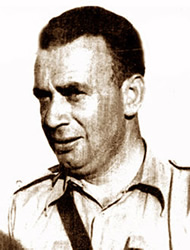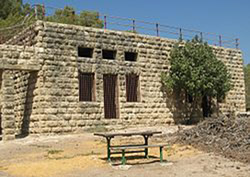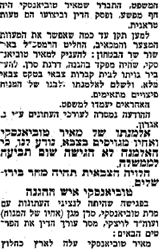Meir Tobianski
Meir Tubiansk
http://www.mako.co.il/news-channel2/Channel-2-Newscast/Article-ff8ca09eb877f31004.htm
iMeir Tobianski , son of Dvora and Yaakov (Hebrew: ???? ?????????) also Tubianski (20 May 1904, Kovno – 30 June 1948) was an officer in the Israel Defense Forces (IDF) who was executed as a traitor on circumstantial evidence on the orders of Isser Be'eri, the first director of the IDF's intelligence branch. A year after the execution, Tobianski was exonerated of all charges.
Tobianski was a major in the British army during the Second World War, then a captain in the Haganah, and was later sworn into the IDF on 28 June 1948, during the Israeli War of Independence.[1] He was also the former commander of Camp Schneller, a military base in Jerusalem.[2] In June 1948 Tobianski had been transferred to command of Jerusalem airstrips.[3] He was an employee of the British-run Jerusalem Electric Corporation. Suspected of passing information of targets for Jordanian artillery, he was taken into custody and sentenced to death by firing squad in a drumhead court-martial.
Spy fever
Even prior to the 1948 war the Haganah had a policy of executing spies and collaborators. In the summer 1947 Moshe Kelman commanded a Haganah squad which executed a Jew accused of collaborating with the British. The execution took place at Kibbutz Dafna.[4] During the siege of Jerusalem, the reports and fears of spies abounded. Lehialone had executed 4 "spies" in Jerusalem including Vera Ducas, a 36-year-old female Austrian Jew who was shot on 29 March.[5] In June, there was a report that "nine Jewish girls are being held by the [Israeli] Army under suspicion of contacts with the enemy."[6] The apparent accuracy of Jordanian shelling of strategic targets led to suspicions that a spy was responsible. Those suspicions were focused on the Jerusalem Electric Corporation.
On 8 July 1948, the Irgun kidnapped five British officials of the Jerusalem Electric Corporation.[7] One of the men was Michael Bryant, to whom Tobianski had been accused of passing information. A month later, they were transferred to the Israeli authorities and on 12 August brought to trial. Three, including Bryant, were released due to lack of evidence.[8] The remaining two men, George Hawkins and Fredrick Sylvester, faced a second trial on 16 September. Hawkins, who was charged with passing information to the Arabs, was released on 30 September. Sylvester, who was married to a Palestinian Jew and had been a member of the Palestine Police, was charged with espionage and complicity in the Ben Yehuda Street bombing. On 6 October, he was found guilty of three charges of espionage and sentenced to seven years in prison. The verdict rested on his possession of a radio with which he had been communicating with the British Consul in the Old City.[9]
Drumhead court-martial and wrongful execution
The school building
During the War of Independence, Tobianski worked for the Jerusalem Electric Corporation and had knowledge of the exact location of several arms manufacturers inJerusalem. These factories had received direct hits from Jordanian artillery.[10]
After arriving at Tel Aviv on 30 June 1948, Tobianski was taken into custody by Shmuel Granizi in the Carmel market. Contrary to the Chief Military Prosecutor's order to arrest and interrogate Tobianski for 10 days,[2] Tobianski was driven from Tel Aviv to Hulda and then onto a deserted school building between the former Arab villages ofBayt Susin and Bayt Jiz, where he was subject to a drumhead court-martial.[10] During the court martial, Tobianski was interrogated by Isser Be'eri, David Kron, Binyamin Gibli and Avraham Kidron.[10] He admitted to showing a list of the consumers to Michael Bryant, British manager of the Jewish section of the Jerusalem Electric Corporation, although the list 'vanished'.[10]
Be'eri, who was late for the trial, had already prepared a firing squad of six soldiers from the Palmach Yiftach Brigade, which was in control of the Jerusalem corridor zone.
Tobianski was found guilty and executed in Bayt Jiz, where his body was buried. He had received neither a lawyer nor the right to appeal, and his case was not reviewed by a higher court.[10]
Posthumous inquiry and rehabilitation]
Several months later, an Israeli Arab by the name of Ali Qasim, who had spied for the Israeli intelligence, was found dead in a forest near Haifa. Be'eri was suspected of ordering his execution, on suspicion of being adouble agent. Be'eri admitted to the charges in court and was dismissed from his lucrative post in the Israel Defense Forces. Due to the efforts of Tobianski's widow, the Military Advocate General ordered Tobianski's case to be attached to this investigation, led by the Military Advocate General Aharon Hoter-Yishai; Tobianski was exonerated by the inquiry.[11][12]
Among the interrogated was Avraham Gorali, the chief military prosecutor at the time, who claimed that the execution was done without his knowledge. However, the chief military police officer, Danny Magen, stated that Gorali contacted him by phone one day before the execution and asked about the possibility of the Military Police Corps carrying out the punishment, which Magen refused. Gorali admitted to such a call, but the investigation's report stated that this was likely an attempt to assess the possibility of carrying out a death sentence in the IDF, and did not imply knowledge of the outcome of the trial.[13]
On 1 July 1949, a year after Tobianski's wrongful execution, a note was sent to his widow, informing her of the acquittal, posthumous and reinstatement of rank to Tobianski. On 5 July, Ben-Gurion issued a public exoneration of Tobianski and on 7 July, his body was reburied in a military ceremony in the IDF's burial grounds on Mount Herzl.[14] On his military gravestone is written, "killed by mistake". Ben Gurion excused Be'eri's actions... "perhaps because the underground laws were still dominant in the army".[15]
Nathan Alterman wrote a protest poem called "The traitor's widow", commemorating Tobianski's widow's successful demand to review his wrongful court martial and damning the oxymoron of "quick trial".
A Hebrew documentary TV film was made on Meir Tobianski.[16]
Be'eri's trial
In November 1949 Isser Be'eri was tried and found guilty of manslaughter by the Tel Aviv District Court. The civilian court found that, as there was a ceasefire in effect at the time, any information supposedly passed by Tobianski could not have served the Jordanian artillery.[15] Due to his extensive service to the country, Be'eri received a symbolic punishment of one day of prison, "from sunrise to sunset, 30 days after sentencing", before which he was pardoned by the president, Chaim Weizmann. Be'eri reportedly left the trial a broken man and ensconced himself in his home until his fatal heart attack in January 1958.
Be'eri's three fellow interrogators, David Kron, Binyamin Gibli and Avraham Kidron, who also had condemned Tobianski as his judges in the afternoon drumhead court-martial, themselves were not charged and tried in court. They reached high military and civilian positions. In his memoir David Kron wrote that despite the official investigation, he was convinced that Tobianski had been guilty and that Be'eri had the full authority to act the way he had. Later Shabtai Teveth placed the fault with Gibli's overbearing ambitions and manipulation, personal traits that led to the Lavon affair.[17]
Footnotes[edit]
1. Jump up^ Shabtai Teveth (1996), Ben Gurion's Spy, Columbia University PressISBN 0-231-10464-2 p. 17
2. ^ Jump up to:a b Inbar, Zvi (1982). "The Killing of Meir Tobianski". IDF in Its Corps: Army and Security Encyclopedia. Volume 16. Revivim Publishing. p. 173. (Hebrew)
3. Jump up^ Nachman Ben-Yehuda (1992), Political Assassinations by Jews: A Rhetorical Device for Justice, ISBN 0-7914-1165-6 pp. 263–264.
4. Jump up^ Kurzman, Don (1970) Genesis 1948. The First Arab-Israeli War. An Nal Book, New York. Library of Congress number 77-96925. pp.479,480
5. Jump up^ Eric Dowton, The Scotsman, 29 March 1948
6. Jump up^ Levin, Harry. "Jerusalem Embattled. A diary of the city under siege." Cassel, 1997. ISBN 0-304-33765-X. Page 230. Entry 5 June 1948. One rumoured to be Abdul Kader Husseini's lover.
7. Jump up^ The Scotsman, 8,9 July 1948.
8. Jump up^ The Scotsman, 12 August 1948
9. Jump up^ The Scotsman, 17, 19 August, 16, 30 September, 9 October 1948.
10. ^ Jump up to:a b c d e Shabtai Teveth (1996), Ben Gurion's Spy, Columbia University Press ISBN 0-231-10464-2 pp. 17–30
11. Jump up^ Inbar, Zvi (1982). "A Tragic Mistake". IDF in Its Corps: Army and Security Encyclopedia. Volume 16. Revivim Publishing. p. 174.(Hebrew)
12. Jump up^ Shabtai Teveth (1996) Ben Gurion's Spy Columbia University PressISBN 0-231-10464-2 pp 31 54
13. Jump up^ Inbar, Zvi (1982). "Tobianski's Trial - Military Police Commander's Testimony". IDF in Its Corps: Army and Security Encyclopedia. Volume 16. Revivim Publishing. p. 173. (Hebrew)
14. Jump up^ Teveth, Page xx.
15. ^ Jump up to:a b Nachman Ben-Yehuda (1992), Political Assassinations by Jews: A Rhetorical Device for Justice, ISBN 0-7914-1165-6, p. 266
16. Jump up^ [A TV film was made on Meir Tobianski.http://www.fresh.co.il/vBulletin/showthread.php?t=504042#post4321432 "TV film"].
17. Jump up^ Shabtai Teveth (1996), Ben Gurion's Spy, Columbia University Press,ISBN 0-231-10464-2 p. 268


